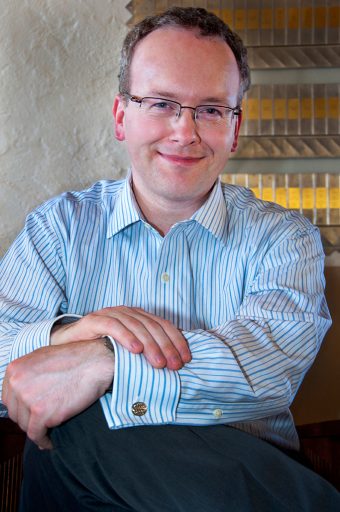
Florida State University Professor Iain Quinn will teach organ lessons, give lectures and play concerts this semester at the distinguished Rimsky-Korsakov State Conservatory in St. Petersburg, Russia, through a U.S. Fulbright Scholar Award. The conservatory is one of the largest and most prestigious music schools in Eurasia and the world.
“I’m thrilled at this opportunity,” said Quinn, an assistant professor of organ and coordinator of sacred music at FSU’s College of Music. “I’ve been to Russia for lectures and concerts before, but I haven’t been in residence for an extended period so this a wonderful chance to be part of a different organ culture.”
Russia’s organ culture is different from North America and Western Europe because organists in Russia are typically more focused on concert work rather than church work. Russian Orthodox services don’t use instruments. It’s largely a choral tradition in which music is sung without accompaniment. Consequently, the approach to teaching organ studies includes a different long-term perspective.
In Russia, organists are often able to make a consistent income with recital work because their skills are in demand at concert halls alongside other instrumentalists. Performances attract large audiences and organists have to be attuned to styles of music that can prove successful in those venues.
“You see far higher attendance at concerts than you would generally in North America and Western Europe and that’s also the case in the former Eastern-bloc countries. There is much we can learn from that, as well as study, in terms of historical and developing trends,” said Quinn, who earned a master’s in music from Yale University and a doctorate in historical musicology from the University of Durham in England.
Part of Quinn’s Fulbright residency will involve research on what these differences mean for music students and their curricula. Quinn expects his Fulbright experience to shape his own teaching.
At Florida State’s College of Music, students in the organ studies program are encouraged to develop a long-term view for their careers with an increasing focus on developing entrepreneurial skills.
Quinn helps students develop skills in multiple fields. They often pursue an advanced degree in a related field such as music theory or musicology to create career options that might include teaching and church positions.
“What we encourage our students to do is think beyond the next five years and toward the next 20 years so they are able to navigate the profession’s changing dynamics more easily,” Quinn said. “so when they’re at a midpoint in their career they don’t run out of options because they’re only trained in one discipline. Organists must be able to serve as choir directors, teach in multiple fields, be able to run a concert series and have a good ability to fundraise.”
The Rimsky-Korsakov St. Petersburg State Conservatory welcomes students from all over the world, enrolls more than 1,300 students and employs more than 400 teachers.
The music school, which dates back to 1862, is named after distinguished composer Nikolai Andreyevich Rimsky-Korsakov.
Quinn looks forward to his Fulbright residency and sees it as an opportunity to share knowledge and understanding between two very different cultures that also have a powerful common denominator.
“It will be a busy time,” Quinn predicted. “But it will also be very exciting because music is a universal language that transcends and inspires.”
The Fulbright Program, the U.S. government’s flagship international educational exchange program, is sponsored by the Bureau of Educational and Cultural Affairs of the United States Department of State. Since its inception in 1946, the Fulbright Program has provided more than 360,000 participants with the opportunity to study, teach and conduct research, exchange ideas and contribute to finding solutions to shared international concerns.



